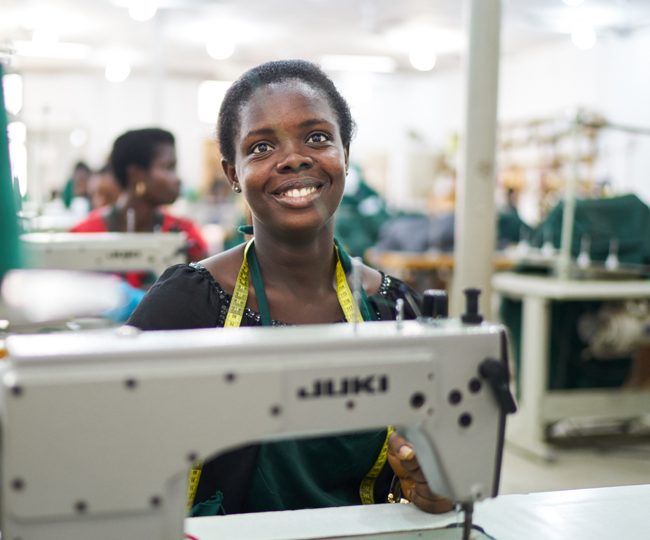‘I wanted to prove that ethical manufacturing should be the way everything is made.’
I’m talking to Keren Pybus, Co-Founder and CEO of Ethical Apparel Africa, and she’s telling me about the events that led up to co-founding her own business. After 18 years of working for Asda’s George clothing and travelling all over the world, Keren found herself challenged by God to do something different.
It began, she says, with a phone call: ‘a friend of mine rang me and said that she’d been praying for me, and felt God saying, “if you want to walk on water, you’ve got to get out of the boat”’. Keren didn’t really know what this ‘walking on water’ would involve for her – she’d already moved to Bangladesh with just two other ex-pats to set up a sourcing office from scratch, and then later moved to South Africa to set up George clothing there.
Then one day, she came back from holiday to find that her company had made 80 out of its 500 employees redundant. She, it seemed, was not one of them, but she was almost disappointed, challenging God that taking away her job would be a good way of getting her to do something different. Just two weeks later, she was called into the conference room and made redundant on the spot.
‘Would I ever have been brave enough to leave Asda on my own?’, she asks, ‘probably not. It had become a bit of a drug for me.’ After her redundancy, her business put her in contact with a life coach and, by working through some tough questions, Keren discovered her passions – ‘the fashion and garment industry was where I wanted to be, and business was what I wanted to be doing’.
Making a change through business, she explains, was deeply important to her: ‘I wanted to prove that ethical manufacturing should be the way everything is made, and set the standard for the way that factories are run’. That means paying a living wage and creating an environment that would win best employer of the year within the factory context.
Over the next couple of months, Ethical Apparel Africa was born, manufacturing in West Africa and focussed on technical capacity and skills-building to develop the industry into a centre of excellence. One particular highlight was winning a large contract when the organisation was just one week old… especially because it was a contract designed for a company that had been around for more than three years!
So, what does it look like to be a Christian CEO of an ethical clothing company? ‘Well, I had absolutely no idea how to be a CEO!’, Keren laughs – she’s the first to admit that she is learning ‘on the hoof’. One of the priorities, though, is complete transparency. ‘We’re always completely honest with clients, even when things have gone wrong – which they often do!’, she explains, ‘and we give a complete breakdown of the costs – from raw materials to trim to factory earnings – whereas most businesses would give only the overall cost of the goods.’
In addition, it seems Keren’s integrity leaves a long-lasting impression, with Ethical Apparel Africa recently picking up a contract with an Australian company. How? Quite simply, because its CEO had worked a few levels above Keren at George clothing 15 years previously and he remembered that she always told the truth and had integrity. He said, she explains, that he wanted to develop an ethical company and supply chain and ‘if I was doing that then he trusted that I was doing it right, because I was always that kind of person, a person who could be trusted’.
That ties into the piece of advice Keren would give to someone starting out in the working world: ‘the best thing you can be within a working environment is yourself. Behave in a way that comes out of your love of Jesus and your Christianity… in the long run, people trust people who have integrity.’


Author
Nell Goddard